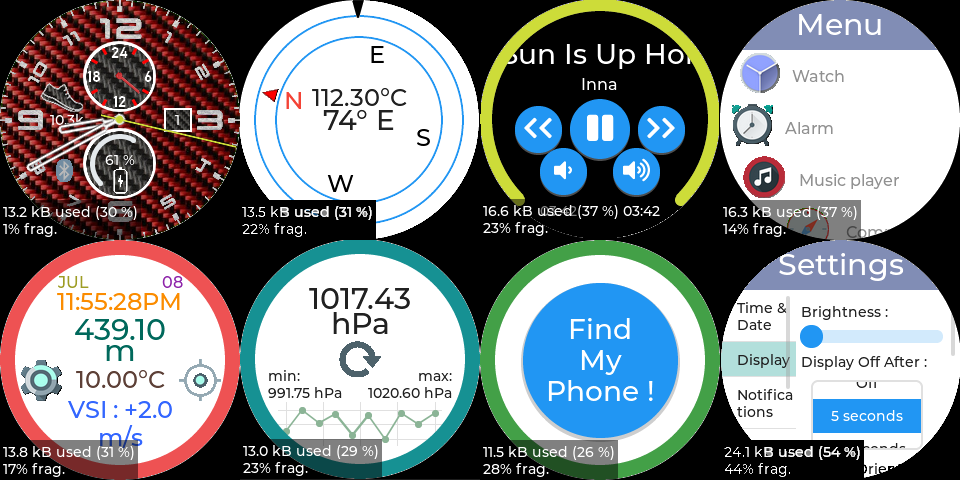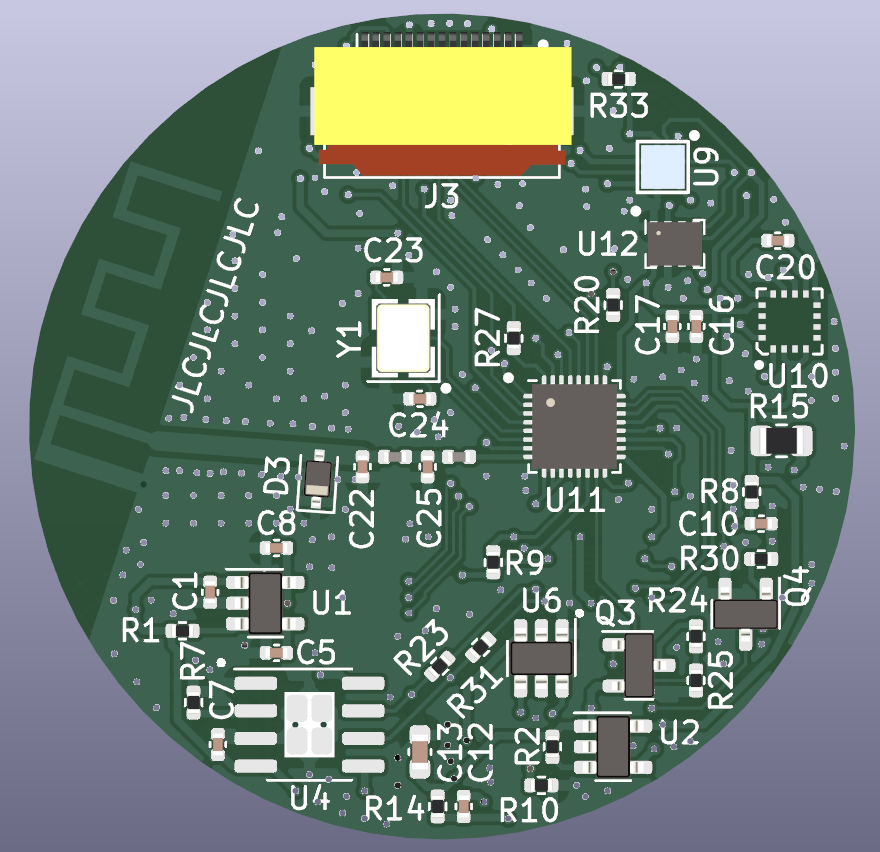Updated current progress status in the README.md file + started to add a getting started section describing the steps required to build and flash the W800_Smart_Watch firmware
8.6 KiB
8.6 KiB
W800_Smart_Watch
Why this project :
I was interested in working on a bigger project with more challenges and which could be useful.
I am also quite unhappy with the smartwatches that are on the market (expensive, no access to the firmware, data collection and privacy issues), that's why I decided to try doing my own that I can fully customize. This is going to be a long adventure with a lot of discoveries along the way :).
I also wanted to test this W800 SOC more deeply and see what it could do and I think it is a perfect fit for the project.
So let's go !
Getting started :
So, you'd like to try this project yourself ?
Here are the steps to follow, to be able to build the firmware and flash the board :
On Windows :
- Start by cloning the repository.
Put it in a path that doesn't contain any spaces ie : C:\Users\Bob\Desktop\projects for example. - Once cloning is done, you will need to install the MSYS2 tool/environment. This tool is need to compile the project using Make.
- Open a terminal by clicking on the MSYS2 icon and execute the following commands to install :
- Update packages :
pacman -Syu- Install make :
pacman -S msys/make- Install automake :
pacman -S msys/automake- Install autoconf :
pacman -S msys/autoconf
A Smart Watch project using the Chinese W800 SOC.
The W800 is a pretty interesting chip with impressive characteristics for its price (around 1$) :
Core :
- 32bit XT804 CPU
- 240 Mhz max clock
Memory :
- 2 MB on chip flash
- 288 KB RAM, ~130 KB available to the user
Wireless connectivity :
- Bluetooth EDR(Classic) and BLE 4.2
- WiFi 2.4Ghz 802.11 b/g/n
Sensors :
The goal is to embed the following sensors in the watch :
- An accelerometer (for wrist tilt detection, single and double tap detection , foot step counting and more)
Possible choices :
- ADXL345
- MPU6050
- BMI160
- LSM6DS3
- BMA456 <-- SELECTED i2c addr : 0x18 or 0x19 7 bit address, has the wrist tilt detection feature.
- A magnetometer (possible choices):
- HMC5883L <-- After reading some comparison articles between the HMC5883L and QMC5883L and the datasheets, the later seems better in term of perfomances.
- QMC5883L <-- SELECTED i2c addr : 0x0D 7 bit address, better soldering footprint
- LSM303DLHC
- BMM150 <-- Package with balls, hard to solder
- An air pressure/temperature sensor (to display the altitude for example)
- BMP280 <-- SELECTED i2c addr : 0x76 or 0x77
Actuators :
- A vibration motor to notify events to the user.
A piezo buzzer: dropped, maybe in next version.
Power source :
- A single 450 mAh cell lipo battery.
- A charge/discharge controller.
Screen + touch element :
- Screen with touch : GC9A01 with touch panel. It uses the required 4 line Serial Interface.
- Touch element i2c addr : 0x15, CST816D I2C touch driver.
Programming and charging :
- The smart watch programming and charging is done through the same USB port
using a magnetic 4 pin plug.
MCU Pin assignement table :
| Pin Number | Pin Name | Type | Function | Pull UP/DOWN | Connected to | Comment |
|---|---|---|---|---|---|---|
| PB_20 | I/O | UART0_RX/PWM1/UART1_CTS/I²C_SCL | U/D | USB/Serial TX flash pin | ||
| PB_19 | I/O | UART0_TX/PWM0/UART1_RTS/I²C_SDA | U/D | USB/Serial RX flash pin and BMA456, Touch Panel, HMC5883L and BMP280 SDA pins | ||
| WAKEUP | I | External Wake Up Pin | D | BMA456 IRQ line and Touch Panel IRQ line through NAND Gate | The chip is waken up when the pin is HIGH | |
| RESET | I | Reset Pin | D | Micro switch and USB/Serial RTS pin | ||
| XTAL_OUT | O | External crystal output | ||||
| XTAL_IN | I | External crystal input | ||||
| AVDD3V3 | P | Chip power supply, 3.3V | ||||
| ANT | I/O | RF Antenna | ||||
| AVDD3V3 | P | Chip power supply, 3.3V | ||||
| AVDD3V3 | P | Chip power supply, 3.3V | ||||
| AVDD3V3_AUX | P | Chip power supply, 3.3V | ||||
| TEST | I | Test function configuration pin | ||||
| BOOTMODE | I/O | BOOTMODE and I²S_MCLK/LSPI_CS/PWM2/I²S_DO | U/D | Touch Panel Reset line | ||
| PA_1 | I/O | JTAG_CK/I²C_SCL/PWM3/I²S_LRCK/ADC0 | U/D | BMA456, Touch Panel, HMC5883L and BMP280 SCL pins | ||
| PA_4 | I/O | JTAG_SWO/I²C_SDA/PWM4/I²S_BCK/ADC1 | U/D | Battery resistor voltage divider output | ||
| PA_7 | I/O | PWM4/LSPI_MOSI/I²S_MCK/I²S_DI/Touch0 | U/D | LCD backlight N-MOSFET driver | ||
| VDD3V3IO | P | IO power supply, 3.3V | ||||
| PB_0 | I/O | PWM0/LSPI_MISO/UART3_TX/PSRAM_CK/Touch3 | U/D | Vibration motor control pin | ||
| PB_1 | I/O | PWM1/LSPI_CK/UART3_RX/PSRAM_CS/Touch4 | U/D | Touch Panel IRQ line | ||
| PB_2 | I/O | PWM2/LSPI_CK/UART2_TX/PSRAM_D0/Touch5 | U/D | Debug UART serial output | ||
| PB_3 | I/O | PWM3/LSPI_MISO/UART2_RX/PSRAM_D1/Touch6 | U/D | TP4056A Charging Signal | ||
| PB_4 | I/O | LSPI_CS/UART2_RTS/UART4_TX/PSRAM_D2/Touch7 | U/D | TP4056A Charged Signal | ||
| PB_5 | I/O | LSPI_MOSI/UART2_CTS/UART4_RX/PSRAM_D3/Touch8 | U/D | Battery resistor voltage divider enable | ||
| VDD3V3IO | P | IO power supply, 3.3V | ||||
| CAP | I | External capacitor, 4.7µF | ||||
| PB_6 | I/O | UART1_TX/MMC_CLK/HSPI_CK/SDIO_CK/Touch9 | U/D | LCD Serial Clock Pin | ||
| PB_7 | I/O | UART1_RX/MMC_CMD/HSPI_INT/SDIO_CMD/Touch10 | U/D | LCD Serial Data Pin | ||
| PB_8 | I/O | I²S_BCK/MMC_D0/PWM_BREAK/SDIO_D0/Touch11 | U/D | LCD Data or Command Selection Pin | ||
| PB_9 | I/O | I²S_LRCK/MMC_D1/HSPI_CS/SDIO_D1/Touch12 | U/D | LCD Reset Pin | ||
| PB_10 | I/O | I²S_DI/MMC_D2/HSPI_DI/SDIO_D2 | U/D | LCD Chip Select Pin | ||
| VDD3V3IO | P | IO power supply, 3.3V | ||||
| PB_11 | I/O | I²S_DO/MMC_D3/HSPI_DO/SDIO_D3 | U/D | BMA456 IRQ 2 line | ||
| GND | P | Ground (Central Pad) |
What is done/working so far - HARDWARE :
- Schematic :
- First version of the schematic is done an available here.
- PCB version 1.0 design is done based on the schematic. Waiting for the PCBs from JLCPCB.
- Wake up interrupts handling :
- Wrist tilt MCU wake up working
- LCD touch wake up
- MCU sleep feature :
- Sleep and Standby modes working but implemented in a crude way.
Can and should be improved.
- Sleep and Standby modes working but implemented in a crude way.
What is done/working so far - SOFTWARE :
- LVGL 8.3.3 running on the SOC using DMA.
- Supported LCD drivers :
- ILI9341 in 4-line serial mode (8 bits) with D/C pin
- ST7789 in 4-line serial mode (8 bits) with D/C pin
- GC9A01 in 4-line serial mode (8 bits) with D/C pin
- Supported LCD touch screen :
- CST816D I2C capacitive touch ic.
- Four screens designed and working with LVGL :
- 1 watch face based on a casio watch.
- 1 menu screen with a list of icons.
- 1 setting screen with basic settings (date and time + display brightness) (work in progress).
- 1 compass application using the QMC5883L.
- Supported LCD drivers :
- Debug UART on PB_2 (output only)
- Sensors/Actuators :
- QMC5883L driver working
- BMA456 driver working
- BMP280 driver working (temperature + pressure + altitude)
- Battery voltage sense using ADC is working
- Vibration motor controlled by PWM working
- Update the W800 SDK from version 1.00.08 to version 1.00.10 released in January of 2023.
To do - HARDWARE:
- Add the MAX30102 Heart Rate Monitor to the current design.
To do - SOFTWARE
- Finish to design the settings page.
- Implement a good algorithm to handle adaptiv MCU clock to save power
- Drivers:
- [] Write/port the MAX30102 Heart Rate Monitor driver to the project.
- Add a wake up alarm app (using the vibration motor).
Achieved power consumption recap:
(Need to work on sleep current :-( )
| Mode | Current draw | Estimated battery life (450 mAh lipo) |
|---|---|---|
| Active (40Mhz clk) (No BLE / No WiFi) |
~52 mA | ~8 hour |
| Active (240Mhz clk) (No BLE / No WiFi) |
~72 mA | ~6 hour |
| Sleep | ~4.5 mA | ~4 days and 4 hours |
| Standby | ~1.8 mA | ~10 days and 15 hours |


